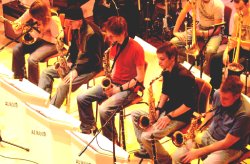
Dr Tony Whyton celebrates the links between education, professional practice and research that prepare graduates at Leeds College of Music for a career in jazz.
Jazz has changed. Even those who thought The Fast Show was an accurate reflection of the music know that the context for jazz, and the current cultural climate in which we all find ourselves working, has changed almost beyond recognition. Two key things have signalled this change.
First, jazz has moved from the periphery of music in education much closer to the centre, and it is increasingly viewed as a worthy bedfellow to the Western classical tradition, even in relatively traditional music degree courses. Leeds College of Music (LCM) was one of the pioneers of jazz education in the mid-1960s and the development of jazz studies programmes at Leeds, and at institutions such as the Guildhall School of Music and Drama, served to support todays established British jazz musicians, and to enable jazz studies to gain a permanent foothold in the UK. Indeed, most conservatoires now routinely offer some kind of jazz study for their students, from one-off workshops to postgraduate degrees, whilst the study of jazz in the university sector spans a multitude of subjects, from sociology to film studies, English literature to history.
Alongside this, the Associated Board of the Royal Schools of Music now offers graded jazz exams, which is certainly a sign of the times. The old debates about whether or not jazz can be taught may continue, but they are now effectively deafened by a tidal wave of investment in jazz studies programmes, tools for jazz pedagogy and the growth of research into jazz and jazz education.
Second, the degree of interconnectivity between the different aspects of the industry has increased, meaning that the relationship between jazz musicians, educators and researchers is now closer than ever. Like many arts professionals, todays jazz graduates need to find a place for themselves in a sector that welcomes, or in some cases demands, a portfolio approach to career development. On a practical level, the proliferation of jazz education courses in recent years has created a range of opportunities for professional jazz musicians to develop portfolio careers. It is difficult to think of an established jazz musician today who doesnt boast an institutional affiliation, educational publication or track record of education projects to their name. Even perceived anti-establishment figures in Europe and the US are now integrally linked to the teaching of jazz; Django Bates has recently been appointed a professor at the Rhythmic Conservatoire in Copenhagen and, closer to home, the anarchic pianist Matthew Bourne, an LCM graduate, now lectures at the College in performance and composition.
So how does a 21st century conservatoire respond to the challenge of preparing its graduates for a successful career in todays complex jazz market? At LCM, we have recognised that it is vital to establish effective links with organisations delivering jazz and to ensure that students and professionals share meaningful and quality experiences. In 2005, the College launched the Centre for Jazz Studies to address this need, and to develop closer links between education, professional practice and research.

The Centre seeks to act as an advocate for jazz regionally and nationally, fostering links between different educational institutions and the wider professional community, and brokering unique jazz projects designed to enhance the student experience. One of our inaugural projects, the creation of the CUK Big Band, typifies the ethos of the Centre. The ensemble draws on the brightest young talent from across the UKs nine conservatoires, who are selected through a national audition process. This type of cross-conservatoire ensemble is unique and enables its members to work creatively whilst team building, networking and communicating with peers in a challenging environment. The group is formed annually and has just a few days to form a creative unit, building towards a centrepiece performance at the Leeds International Jazz Conference.
The groups artistic horizons have expanded with the Creative Exchange project, devised by the Centre with support from the PRS Foundation. This ambitious project is designed to produce a core repertoire of new music for the ensemble through a three-year programme of professional commissions and student awards. Composer Tim Garland was commissioned by the Centre for the first new work, Hero Joe, in 2005, and two new compositions by Issie Barratt and Julian Joseph will be premièred in Leeds in March.
Alongside the professional commissions each year, the Creative Exchange project includes a student big-band composition award, open to any UK music student, which supports developing composers. Award-winning composers work alongside professionals in developing their projects, and receive financial support to showcase their music as part of the CUK Big Bands core repertoire. Nick Peck won the award in 2005 with Moonstruck, a sophisticated and subtle new work that gained praise from the national press. In building its repertoire, and developing relationships with a range of musicians, the CUK Big Band aims to go on the road in 2008 and may land at a venue near you there will be few better ways to hear the future of jazz.
Dr Tony Whyton is Head of the Centre for Jazz Studies at Leeds College of Music and a director of JazzYorkshire. The CUK Big Band will be performing at The Venue on 24 March as part of Leeds International Jazz Conference.
For details,
w: http://www.lcm.ac.uk;
e: t.whyton@lcm.ac.uk



